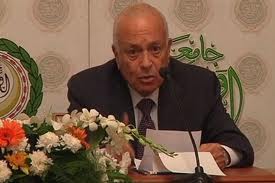 The head of the Arab League has asked the U.N. Security Council to boost the size of a U.N. mission in Syria and give it expanded powers to protect people following a surge in violence there, according to a letter leaked to media outlets on Friday.
The head of the Arab League has asked the U.N. Security Council to boost the size of a U.N. mission in Syria and give it expanded powers to protect people following a surge in violence there, according to a letter leaked to media outlets on Friday.
Images of the bloodied bodies of children and others massacred in the city of Houla in attacks blamed on President Bashar al-Assad’s forces have shocked the world and highlighted the failure of a 6-week-old U.N.-backed ceasefire plan to stop the violence in the 14-month uprising against Assad’s rule.
Nabil Elaraby, secretary-general of the Arab League, condemned the attacks in a letter to the Security Council.
“I therefore urge you to move quickly to end all acts of violence taking place in Syria, and to take the necessary measures to protect Syrian civilians, including increasing the number of international monitors and allowing them the necessary powers to put a stop to the violations and crimes being committed,” Elaraby said in the letter.
Elaraby, who has said the violence was intended to undercut a truce brokered by international mediator Kofi Annan that never took hold, is struggling to keep alive Annan’s six-point peace plan and avert full-scale civil war in Syria.
His letter was first reported by Lebanon’s LBCI television and confirmed by Reuters. Security Council diplomats in New York said they received the letter, although it was not immediately clear how they would react.
Elaraby’s suggestion of giving the U.N. mission the power “to take the necessary measures to protect Syrian civilians” might not be acceptable to Russia, which has a veto on the 15-nation council.
That is similar to language the council used last year to authorize military intervention in Libya, which Russia did not veto but has criticized ever since. Russia has vowed to prevent Syria from becoming another Libya, where it says NATO air strikes provided support to rebels and led to “regime change.”
It was also not clear whether the Syrian government would consent to an expansion of the mission, known as UNSMIS, or allow it to be armed, which would make the monitors more like peacekeepers than unarmed observers.
‘BLUE BERETS’ IN DANGER
The monitoring force only has a mandate to monitor compliance with Annan’s peace plan and report violations to the United Nations.
But U.N. Secretary-General Ban Ki-moon told the Security Council in a letter last week that “United Nations observers are facing increasing criticism for not stopping the violence and, in some quarters, even being blamed for an increase.”
“There is a misconception, difficult to correct, about the role of unarmed military observers and what they can and cannot do,” he said. “This puts the United Nations presence on the group in a perilous position.”
One option under discussion in New York is to expand the U.N. observer mission in Syria and bolster its mandate by allowing “blue berets” to carry weapons, U.N. diplomats say. It is unclear whether that would be acceptable to Damascus.
The Arab League sent its own monitors to Syria late last year to check compliance with an earlier peace plan, but withdrew them in January when violence intensified.
The 90-day mandate of the 300-strong unarmed observer force will expire around July 20. One Western diplomat said the world body would then have to decide whether to renew the mission, expand it or scrap it altogether.
“It’s going to be a kind of moment of truth for the Security Council, whether to press ahead with the Annan plan or abandon it,” the diplomat said.
Reuters

Leave a Reply
You must be logged in to post a comment.